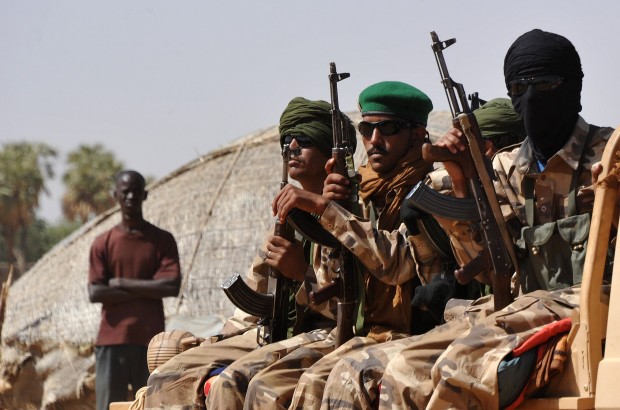French and accompanying African forces have liberated the city of Timbuktu-in the west African state of Mali-less than a year after it was first overrun by Tuareg tribes who then handed it over to Al-Qaeda in the Islamic Magreb (AQIM), which in turn governed the city in accordance with its vision of Sharia law.
During the recent liberation process, many jihadist and Salafi Islamist groups condemned what was happening as a perceived return to colonialism. Now everyone is competing to clarify the enormous wealth that the state of Mali enjoys, first and foremost through its seemingly endless gold reserves, and also due to its mountains of precious uranium; a resource that is necessary for everything from power stations to nuclear warheads. Some reports also pointed out that lying under the soft sand that extends across the Sahara is a massive amount of oil. And with that, the magic word was uttered. For centuries the Arabs and Muslims have known no riches other than black gold. Ordinary gold came up frequently in the stories of Ali Baba and Sinbad, but the modern Arab world knows little of it. Oil, however, is another story. The oil wealth that came to the Middle East brought with it cities, towers, and modernity, along with greater capabilities and possibilities. Yet this attracted not only other Arabs, but people from all nationalities and ultimately the armies of the world.
So the French military-and the African armies with them-came for huge fortunes, most notably oil, and the story has certainly taken on a colonial dimension. But the question that one must ask here is: If the state of Mali actually has all this wealth why is it considered one of the world’s poorest countries and one of Africa’s most impoverished? It is no secret that Mali occupies the bottom rung among the countries of the world; it is placed 178th in the Human Development Report and per capita income does not frequently exceed USD 600, despite the prevalence of gold and oil. It is amazing that the state is so poor when it occupies an area of more than a million square kilometers and has a population of less than 14 million. In other words, Mali is four times the size of Japan with approximately a tenth of the population. Yet all this poverty and unhappiness is down to successive crumbling political regimes; economically primitive and with social policies straight out of the Middle Ages. So why should we be surprised that a country rich in enough treasure to fill Ali Baba’s cave also suffers from abject poverty? The whole story came to a head in the small city of Timbuktu. Despite its modest population of no more than half a million people, by Malian standards Timbuktu is one of the country’s most important and largest cities. It is even more famous than Bamako, the capital, for the simple reason that it was one of the great metropolises of Islamic civilization in central and west Africa. Timbuktu, for many historical and geographical reasons, has become a hallmark of Islamic civilization in that region of the world. It houses universities and madrassas filled with scholars, and an institute packed with rare Islamic manuscripts, which the residents of the city see as part of their historical heritage and even as part of their identity.
Then the barbarians came. The African and Islamic world has been plagued by this scourge from the outset, namely a failure to deal with minorities, whether religious or ethnic, and establish a system of governance that absorbs them. In all simplicity Mali failed to deal with the issue of the Tuareg, who occupy the north of the country and constitute 10 percent of the population. After the Arab Spring, the issue of democracy came to prominence and talk secession and fragmentation in the country was revived, while the Malian military lacked the necessary sensitivity to deal with these complex issues, favoring brute force rather than negotiating and resolving the crisis. In the end, the Tuareg invaded Timbuktu. Afterwards, AQIM interfered in order to consecrate an Islamic state, seeking to transform the country from its natural state into another version of Afghanistan under the rule of the Taliban.
The New York Times recounted how Al-Qaeda groups or those affiliated to AQIM gathered and invaded the city aboard vehicles armed with guns, in order to impose their new Islamic constitution. This was a bizarre move in a city that has never been a stranger to Islam, like someone preaching to the choir. Yet the people did not understand how AQIM’s Islamic instructions could be distributed at gun point, and applied through intimidation. Al-Qaeda quickly entered into an agreement with the city’s hospital to treat the wounded among their ranks and give them everything they needed in terms of medical advice, in return for allowing the hospital staff to provide healthcare to the people of Timbuktu. It was not long until doctors at the hospital were asked to oversee operations to cut off the hands of those accused of theft, or to supervise the stoning of those accused of adultery, in a city known throughout Islamic tradition for its righteousness. The whole thing was absurd; these doctors learned their job connecting broken limbs, not forcefully removing them.
This is what has happened in Timbuktu so far, but one aspect has been heroic. The people of the city, amid attacks, intimidation, rape, and murder, have succeeded in smuggling 28,000 of the 30,000 Islamic manuscripts stored in the city’s Institute for Higher Studies and Islamic Research. Jihadist groups had insisted on burning these documents before they fled the city after the French bombardment began.
The liberation of Timbuktu is perhaps another step in the long process of understanding this new wave of extremism that is sweeping the entire region under the banner of Islam, while the true religion is completely innocent.
